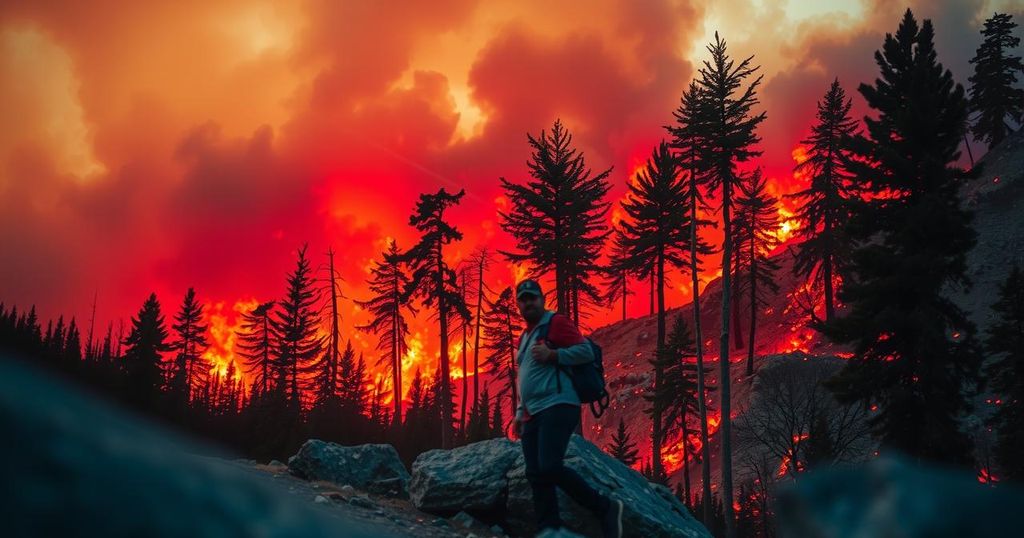Celebrity
AFRICA, AMERICA, BRITAIN, CALIFORNIA, CLIMATE CHANGE, DONALD TRUMP, EL, ELON MUSK, ENVIRONMENT, GAVIN NEWSOM, GHANA, GOVERNMENT POLICY, HOLLYWOOD, IMMIGRATION, KAREN BASS, LEFT, LOS ANGELES, NORTH AMERICA, PACIFIC OCEAN, PACIFIC PALISADES, SKY NEWS, UK, UNITED STATES, US
Lena Nguyen
0 Comments
Public Accountability in the Wake of LA Wildfires: A Shift from Climate Blame
The article discusses the recent wildfires in Los Angeles, emphasizing a shift in public sentiment from blaming climate change to holding government officials accountable for budget cuts that hindered disaster response. Residents express frustration toward Mayor Karen Bass and Governor Gavin Newsom for their inadequate management of wildfire prevention funding. This reflects a growing demand for accountability from political leaders during crises, suggesting a critical examination of their roles amid such disasters.
Recent wildfires in Los Angeles have sparked a significant shift in public discourse regarding disaster accountability. Traditionally, disaster management narratives in the U.S. have been dominated by climate change explanations, particularly from Democratic leaders. However, this narrative is facing increasing skepticism as affected residents direct their frustrations at government officials, particularly regarding budget cuts that directly impacted wildfire management efforts.
In the wake of the devastating wildfires that have claimed ten lives and destroyed several neighborhoods, including the Pacific Palisades, it is clear that many residents are unwilling to accept the narrative that solely blames climate change. Mayor Karen Bass has faced criticism for her absence during the crisis, especially following her decision to reduce funding for the fire department by nearly $17.6 million. This lack of accountability from political leaders has sparked outrage among the populace, who are demanding explanations for the government’s failure to adequately prepare for such disasters.
Furthermore, Governor Gavin Newsom has also come under fire for reportedly cutting $150 million from the state’s wildfire prevention budget while maintaining a significantly larger allocation for climate initiatives. The situation raises important questions about resource allocation and government competency, especially regarding basic necessities such as functioning fire hydrants in a state that experiences regular wildfires. Such queries point to the pressing need for government accountability during crises of this nature, reflecting a growing public demand for responsibility rather than excuses.
As the situation continues to unfold, the focus is shifting from attributing blame to climate change towards a more critical examination of state and local leadership’s preparedness and response to natural disasters. Residents expect their government to not only keep them safe but to also effectively allocate resources to mitigate risks before tragedies occur. It is a pivotal moment for public discourse on disaster management in America, revealing a populace that is increasingly active and engaged in holding elected officials accountable for their actions during disasters.
The article addresses the recent wildfires in Los Angeles, California, which have resulted in numerous fatalities and extensive property damage. In the wake of these fires, public sentiment has evolved, with citizens challenging the narrative that attributes the disasters solely to climate change. This shift marks a broader trend in which citizens are focusing on the responsibilities and failures of local and state government officials, particularly regarding budgetary decisions that may have exacerbated the wildfires. The changes in the public’s attitude highlight the demand for greater accountability from political leaders in managing climate-related disasters.
In conclusion, the recent wildfires in Los Angeles have highlighted a critical shift in public accountability towards government officials responsible for disaster management. As residents increasingly reject the climate change narrative that absolves politicians of responsibility, they are seeking answers and demanding accountability for decisions that impact their safety. This emerging discourse underscores the importance of effective leadership and resource allocation in mitigating the effects of natural disasters. Furthermore, it represents a significant moment where constituents are urging their governments to be proactive rather than reactive in crisis situations.
Original Source: www.telegraph.co.uk




Post Comment